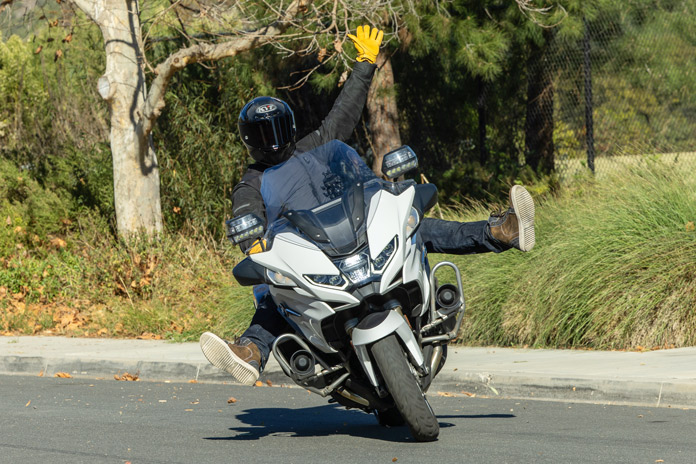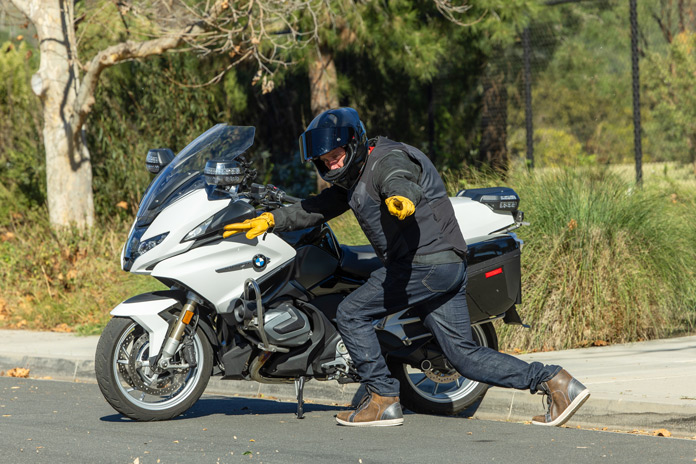
I fully appreciate that my role within the space of these two pages of Motor School is to provide you with riding concepts, training exercises, and things to think about to help make you a better, safer rider. I get that. But today I thought I’d start with a question, and then together we can unpack some ideas and see if any of this stuff sticks. Sound good? Here goes.
Why do you ride a motorcycle?
Now before you roll your eyes and stuff me into your sock drawer with the March 1983 issue of Popular Mechanics you’re saving because of an article you forgot about long ago, just think about the question.
At first glance it may seem silly. Surely you ride because it’s fun, it represents freedom, or it’s a long-standing ritual you and your buddies do together. There’s nothing wrong with any of those, but I want to challenge these broad-stroke answers by arguing that your level of personal satisfaction from riding has steadily degraded from when you first fell in love with motorcycles. Yes, you still enjoy it, gravitate towards it, and appreciate the shared experience you get when meeting up with your buddies. But if you’re honest, the magic motorcycle elixir is not as potent as it once was.
I started riding when I was 9 years old. I sucked. I barely knew how to shift gears, stalled regularly, and had no idea why I needed a front brake when I had a perfectly good rear one I could stomp on. My definition of bike maintenance was cleaning off whatever dirt accumulated on the seat by rubbing it off with my jeans as I rode. Yet despite my lack of skill, experience, good equipment, trophies, or riding buddies, the joy I had when riding was absolute. I rode, and when I wasn’t riding, I was thinking about it, dreaming about it, talking about it, on and on.
This early experience sent me on a path probably similar to yours: I stitched motorcycles into the fabric of my daily life through training, racing, equipment upgrades, like-minded friends, and newfound skills. But as the years ticked by, it started to feel routine, and I chased that first high from those early days by riding more, buying more, and just doing more on the bike. I didn’t know it, but the magic was fading.
Why? And what was this magic ingredient that was slowly leaking out of my motorcycling experience? Over time, I came to realize I was losing joy. Pure and simple. The joy that 9-year-old Quinn experienced was slowly dissipating. After giving it some thought, I figured out that to maintain joy, I should have kept up with my on-bike discovery. Without discovering new things, I was essentially going through the motions, falling into that familiar routine of riding I had known for years. Little by little, the joy went away.
My leaky bag of joy was due to two key things: 1) Diminishing returns on my riding investment: Just like anything we get better at, the learning curve tapers off as we climb, providing less and less juice for the squeeze. This made new discoveries (and the joy I got from them) harder to come by, so at some point I stopped discovering and just went with what I knew. 2) Once I stopped discovering new things, I was living off whatever process I had adopted up to that point, and it started to feel like Groundhog Day. I’m not saying I didn’t still love motorcycles or failed to appreciate my abilities on the bike, but the ride-rinse-repeat cycle got old after a while.

Fast forward to when I went to police motor school. I had to learn new ways of interacting with the motorcycle and new ways of thinking about my environment as a motor officer. In other words, I started to discover new things. Was I the best motor officer when I graduated from motor school? Absolutely not. Did I make lots of mistakes and have some near misses in the early years? Without a doubt. But I was discovering new things, and in the process, finding joy in ways I hadn’t since I was 9. It was transformational.
This brings me to my long and winding point: I want you to find joy in your riding experience again too! That same joy you felt precisely 30 seconds after you swung your leg over a motorcycle for the first time in your life.
Now pay close attention: Here’s how we get the joy back and make sure we never lose it again. The first thing we need to do is disconnect our thinking that a given level of riding ability has anything to do with discovery and joy on the bike. It doesn’t. And for that matter, I ask that you let go of the anxiety and judgment you often feel when someone shows you something new on the bike.
Hey, I get it: The more we learn, the farther behind we tend to feel. And rather than finding joy through discovering new ideas, we negatively judge our existing abilities, get frustrated, and decide that we stink. Well, I’m here to tell you that thinking like that doesn’t move the joy needle. Stop judging yourself and concentrate on discovery.
Now that we understand that joy comes from discovering new things, regardless of our individual skill level, let’s ask where and how we might increase the probability of finding it. Here’s a mental exercise for you: Think of someone you know who rides worse than you. Someone with less skill, maybe less time on the bike, and less overall ability. Now be honest, would you ever ask this person for riding tips? Especially when there are far better technical riders out there who you can learn from? I’m guessing no, you wouldn’t. And I think most people would agree with you. After all, why pay attention to techniques and execution performed by lesser-skilled individuals, right? But why not?
If we agree that we are going to reset our compass and point it towards discovery, why can’t everybody be our teacher? Can’t I, theoretically, learn something from anyone, assuming I pay close attention, stay humble, don’t judge, am willing to learn, and try new, even contradictory ideas? A resounding “yes” on all counts. In fact, some of the best motor techniques I’ve discovered over the years were from closely observing riders that didn’t even break into the top 100 in competition standings. That’s huge, because that meant my discovering new ideas didn’t require or have anything to do with whether they originated from “good” teachers or not. Just chew on that for a minute.
Once we focus on discovery, the lessons can come from virtually anywhere. Does this mean we adopt them all and blindly incorporate them into our program? No. But it means we start to ask ourselves, What can I discover in this particular observation? Isn’t that the same question you asked when you started riding motorcycles? Were you not open-minded, absorbing everything around you? Did you not discover new things just about everywhere you looked, regardless of a rider’s skill, the environment, the location, or the type of bike somebody rode? Absolutely, because you were excited to experience everything motorcycles had to offer. Well guess what? You can get back there!
I’ll finish up with this: The world is full of lessons if you open your mind and look for them. And lessons are an opportunity for discovery if you stay humble and allow yourself to accept the information. Of course, discovery will undoubtedly lead to increased ability on the bike, but the real benefit will be newfound joy in the process. Wild, crazy, silly 9-year-old joy from this point forward and for the rest of your life on the motorcycle. Pretty damn cool, huh?
Quinn Redeker wears Lee Parks Design gloves exclusively. Find Quinn at Police Motor Training.
See all Motor School with Quinn Redeker articles here.








Spot on. When we stop learning we stop enjoying. After riding on the street for forty plus years, I decided to try my hand off-road. My joy levels went through the roof. After fifty years of riding I decided to become a MSF rider coach. There isn’t a class that goes by where I don’t learn something from the perspective of a first time rider. It’s a win-win.
Hey thanks Richard- it’s nice to hear this thinking resonated with you! I appreciate your taking the time to comment👍